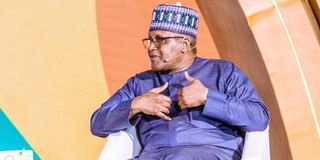Dangote tips Africa to invest locally, build industrial base

Africa’s richest man, Mr Aliko Dangote
Abuja. Africa’s richest man, Mr Aliko Dangote, has urged African nations to prioritise local investment, build strong financial institutions, and establish a solid manufacturing base if the continent is to break its dependency on foreign capital and raw commodity exports.
Speaking during a high-level dialogue at the Afreximbank Annual Meetings in Abuja, Mr Dangote, who is a Nigerian businessman, said the continent’s industrial take-off is being hindered by capital flight and a lack of strategic commitment to continental growth by its own elites.
“The real reason Africa hasn’t taken off like Asia is because most people who make money here take it out of the continent. If I’m not investing at home, how do I convince others to come and partner with me to build Africa?” Mr Dangote said during a conversation about the path to making Africa great again.
“Encourage domestic investors and once they are doing well, that’s an invitation to foreign investors,” he added.
He cited Asia’s success in building robust local economies by retaining wealth within their borders, contrasting this with Africa’s continued reliance on foreign capital and imports.
The industrialist warned against premature market liberalisation, saying opening up economies without adequate domestic capacity is akin to “leaving your windows open at night—you’ll be disturbed by mosquitoes.”
“If you open up your market without safeguards, you're inviting dumping. That’s not fair competition. America imposed up to 50 percent tariffs on imported steel and aluminium to protect its industries. Without those measures, their industrial base would have collapsed,” he explained.
Mr Dangote pointed out that Africa's industrial challenges are rooted in two key issues: erratic electricity supply and inconsistent policy support.
But he insisted that these are problems that can be solved with the right political will and local investment.
Citing his own experience, he recounted how his conglomerate invested in cement production at a time when Nigeria was importing over 14 million tonnes annually.
“Everyone thought we were crazy. But we persisted. Today, Nigeria produces over 16 million tonnes and no longer imports cement,” he said.
He noted that Nigeria is now the continent’s largest producer of fertiliser, with his company poised to stop imports completely and export to Asia and the United States.
“Give it 14 months, and we won’t be importing fertiliser anymore. We’ll produce more than the US. We’re building the largest fertiliser plant in Africa,” he added.
Mr Dangote also disclosed plans to list his refinery project on the stock market, giving ordinary Nigerians the opportunity to own part of the country's most ambitious industrial project.
“We want Nigerians to feel a sense of ownership. When people have a stake in the economy, they support it,” he said.
On the global scramble for Africa’s resources, Mr Dangote cautioned African leaders to avoid lopsided deals that benefit foreign partners without local value addition.
“Stop exporting raw materials and buying back finished products at 20 times the cost. Process the minerals here. Create jobs here. That’s how you grow,” he emphasised.
He criticised corruption on the continent but said the bigger problem is capital flight.
“Corruption exists everywhere. But in Asia, the money stays in the country. In Africa, we steal and stash it abroad. When you die, it vanishes in the foreign banking system,” he remarked.
Mr Dangote called for a mindset shift among African leaders, urging them to place Africa first in all decisions and policies.
“We must take ownership of our development. No one will do it for us. Foreign investors will only come when local investors show confidence,” he said.
The businessman praised the role of institutions like Afreximbank in financing Africa’s transformation, but stressed that African nations must do more to de-risk investment environments themselves.
“We don’t need charity—we need vision. Build local value chains. Strengthen agriculture. Focus on our mineral resources. Africa can and should be a global industrial powerhouse,” he said.





